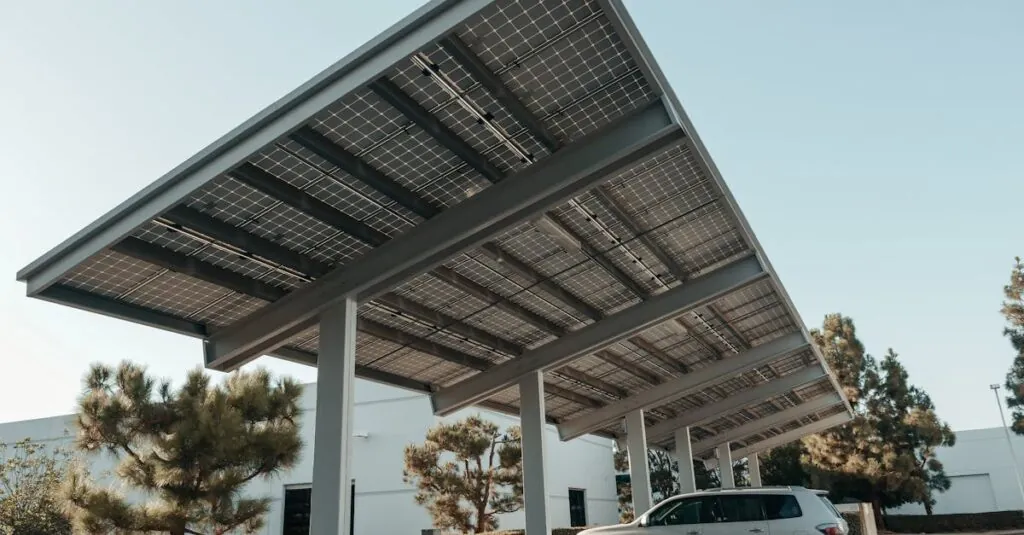Finding a parking spot can feel like a modern-day treasure hunt—minus the treasure and with a lot more frustration. Enter smart parking solutions, the heroes of urban mobility. These innovative systems not only save time but also reduce stress levels, making the quest for parking a thing of the past.
Imagine cruising into a city and effortlessly locating a spot without circling the block like a lost puppy. Smart parking technology uses real-time data to guide drivers to available spaces, cutting down on emissions and traffic congestion. It’s like having a personal parking assistant, minus the awkward small talk. Embracing these solutions isn’t just about convenience; it’s about transforming the parking experience into a seamless part of urban life. Who knew parking could be this smart—and this fun?
Table of Contents
ToggleOverview of Smart Parking Solutions
Smart parking solutions leverage advanced technology to streamline the parking process in urban settings. These systems utilize sensors, apps, and data analytics to provide real-time information about available parking spaces.
Definition and Purpose
Smart parking refers to innovative systems designed to improve the parking experience for drivers in congested areas. These solutions aim to guide users to the nearest available parking spots, reducing the time spent searching. Furthermore, smart parking apps often allow users to reserve spots in advance, promoting efficient use of parking resources. By integrating sensors and mobile technology, these systems enhance the overall urban mobility experience.
Why Smart Parking Solutions Matter
Smart parking solutions play a crucial role in alleviating urban congestion. They decrease the number of vehicles cruising for parking, which contributes to significant reductions in emissions. These systems also offer benefits such as increased revenue for municipalities through optimized parking usage. Moreover, smart parking fosters a more enjoyable experience for drivers, encouraging a shift towards more sustainable urban transportation options. With the rising number of vehicles in cities, smart parking solutions become essential for effective urban planning.
Technology Behind Smart Parking Solutions
Smart parking solutions rely on advanced technologies to improve urban parking experiences. These systems utilize multiple components to provide efficient, user-friendly services.
Sensors and IoT Integration
Sensors play a crucial role in smart parking frameworks. They detect vehicle presence in parking spots, transmitting real-time data to centralized systems. The Internet of Things (IoT) enhances connectivity between sensors and databases, allowing instant updates on available spaces. This technology significantly reduces the time drivers spend searching for parking. Accurate data collection from these sensors also helps municipalities make informed decisions about urban planning and resource allocation. Implementing these technologies can lead to better space utilization and reduced congestion.
Mobile Apps and User Interfaces
Mobile apps enhance user interactions with smart parking systems. These applications guide users to the nearest available parking spaces by displaying real-time information. A user-friendly interface allows drivers to reserve spots in advance and pay seamlessly. Integrated navigation features direct users efficiently to their chosen locations. Notifications inform drivers of potential issues, such as impending time limits or availability changes. Employing intuitive mobile apps significantly improves the overall parking experience by making it simple and accessible for all users.
Benefits of Smart Parking Solutions
Smart parking solutions offer numerous advantages for urban drivers and municipalities alike. These systems enhance the overall parking experience and contribute positively to city environments.
Improved Parking Efficiency
Smart parking solutions significantly enhance parking efficiency. They utilize real-time data to direct drivers to available spaces quickly, reducing the time spent searching for parking. This technology minimizes congested areas, leading to a smoother flow of traffic. Research indicates that smart parking can improve space utilization by up to 30%. Automated systems for reservations and payments streamline operations further, saving valuable time for users. In busy urban centers, these solutions optimize parking operations and create a more manageable environment for city planners.
Environmental Impact
Smart parking systems contribute positively to environmental sustainability. By reducing the time vehicles spend idling while searching for parking, these solutions decrease greenhouse gas emissions. Studies show that smart parking can lower emissions by approximately 10% in urban areas. This reduction also alleviates congestion, resulting in less fuel consumption. As smart parking continues to grow, its positive impact on air quality becomes increasingly important. Cities adopting these systems foster a more sustainable approach to urban transportation, benefiting both residents and the environment.
Challenges and Limitations
Smart parking solutions face various challenges that impact their effectiveness and implementation. Addressing these limitations is crucial for optimizing their potential benefits.
Infrastructure Requirements
Implementing smart parking systems necessitates substantial infrastructure upgrades. Many cities lack the necessary technology, such as sensors and data management systems, for effective deployment. Upgrading existing parking facilities often incurs significant costs, creating a challenge for municipalities. Moreover, seamless integration with public transportation systems can put additional pressure on budgets. Collaborating with technology providers and local governments often becomes necessary to overcome these hurdles and achieve successful implementation.
Privacy and Security Concerns
Privacy and security issues surge with smart parking technologies. Real-time data collection raises concerns about how user information is handled and stored. Drivers often worry about unauthorized access to personal data, especially when utilizing mobile apps or online platforms. Implementing robust cybersecurity measures is essential to address these risks and build user trust. Legislation surrounding data protection further complicates matters, as cities must ensure compliance with regulations while developing innovative solutions. Balancing functionality and security remains a significant challenge in the adoption of smart parking systems.
Future Trends in Smart Parking Solutions
Emerging trends in smart parking solutions reveal advancements that could reshape urban transport. Integration with autonomous vehicles signifies a pivotal shift. As self-driving technology evolves, smart parking systems will adapt to facilitate seamless vehicle navigation and parking. Vehicles will communicate directly with parking infrastructure, ensuring efficiency in locating spots without human intervention. Data shows that this integration could streamline operations, allowing for automated reservation systems to enhance user experience.
Artificial intelligence plays a crucial role in enhancing smart parking solutions. Intelligent algorithms analyze real-time data to optimize parking space allocation. Machine learning capabilities enable systems to predict peak demand times, which assists municipalities in proactive planning. AI also helps process user feedback for continuous improvement. Reports indicate that implementing these technologies can boost space utilization rates by around 20%, significantly benefiting city infrastructures and drivers alike.
Smart parking solutions represent a significant leap forward in urban mobility. By harnessing technology to streamline the parking process they not only alleviate congestion but also promote a healthier environment. The integration of sensors and IoT ensures drivers find available spaces with ease while minimizing emissions and enhancing city planning.
As cities continue to grow the importance of these systems will only increase. The potential for future advancements such as autonomous vehicle integration and AI-driven analytics highlights the ongoing evolution of smart parking. Embracing these solutions will ultimately lead to more efficient urban transportation and a better quality of life for residents.






